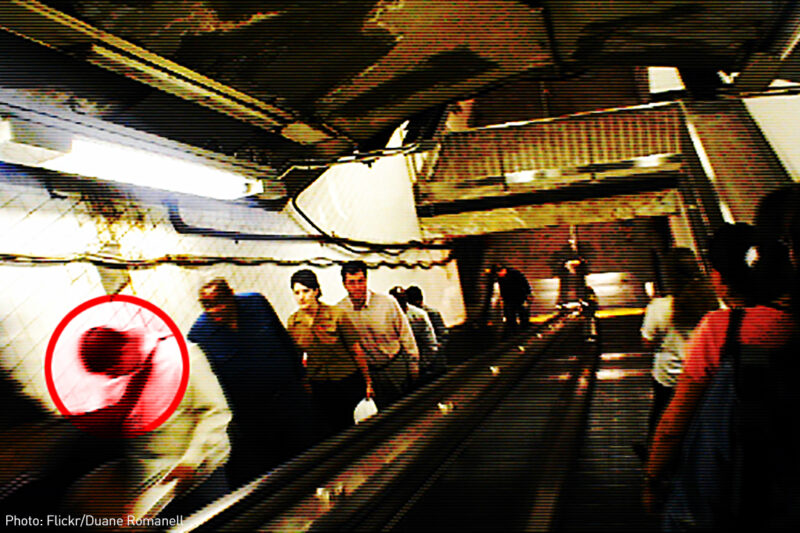
A private service that banks, employers, and government agencies use to screen customers and clients is blacklisting thousands of people as terrorists, sometimes based on nothing more than inaccurate and bigoted materials online, according to a VICE News .
Thomson-Reuters’ “World-Check” database slaps a “terrorism” designation — and a picture of a red balaclava — on the profiles of individuals, charities, and religious institutions. Many of them are Muslims who have never been charged or even accused of terrorism-related offenses. The results are far-reaching and can include closure of the blacklisted individuals’ bank accounts, inability to get a job, or denial of government benefits. (And World-Check the chasing billions of dollars in the risk mitigation industry.)
Blacklisting by private companies ľ±˛ő˛Ô’t new. Banks and insurance companies have long “” neighborhoods in order to deny services to racial or ethnic minorities. The entertainment industry used the infamous to deny employment to actors, writers, and directors with suspected communist sympathies.
World-Check, however, appears particularly zealous in its effort to cash in on widespread fear of terrorism and a regulatory system that raises the stakes for banks and other companies desperate not to be accused of financing terrorism. Its confidential database includes more than 2.7 million individuals and entities, over 93,000 of whom it has designated as terrorists. According to a World-Check , the company contracts with “49 of the world’s 50 top banks,” over 300 government agencies, and “9 of the top ten global law firms.” The Department of Homeland Security uses World-Check, as does , an employment screening company that conducts background checks for more than 40,000 organizations in 240 countries.
This kind of blacklisting for profit raises serious concerns about discrimination and the lack of meaningful appeal process that parallel our longstanding criticisms of government blacklisting. Just as the U.S. government uses a low, exception-ridden standard for its master watchlist — indeed, a single Facebook post or Tweet can provide all the “reasonable suspicion” necessary to watchlist someone — World-Check apparently labels people “terrorists” based solely on allegations from anti-Muslim zealots like Steve Emerson, who, according to the , has “a history of fabricating evidence that perpetuates conspiracies of radical Islam infiltrating America through Muslim civil rights and advocacy organizations.”
Like the government, which blacklists people even after acquittal or closure of a terrorism-related investigation, World-Check uses its “terrorism” designation for people who have not been charged with a crime but may be accused, questioned, or investigated for terrorism offenses — a vast body of innocent people. And World-Check apparently shares the government’s lack of concern about stale information. Just as the government has used decades-old, unproven allegations to place some of our clients on the No Fly List, VICE reports that World-Check has failed to update some of its terror-designated profiles for as long as eight years.
Both World-Check and government watchlists also impose severe consequences on the people they label as terrorists. Inclusion on a government watchlist can cause detention at the border, harassment, and inability to travel by air or sea — to say nothing of the shame and fear that comes with being a terrorism suspect. World-Check’s terrorism designation can prompt banks to close people’s accounts, convince prospective employers not to hire a candidate, and cause funding sources for organizations or contractors to dry up.
There’s even the alarming possibility of a growing feedback loop between government and private blacklists. The Department of Homeland Security’s Analytic Framework for Intelligence, a massive data-mining project, “commercial data aggregators” like World-Check to analyze “individuals of interest” and identify “non-obvious relationships” with others. That not only broadens the government’s lens of suspicion, but it could also intensify the focus on affected individuals, potentially leading to more and more blacklisting — both public and private.
World-Check is similar to the government in another way that compounds all the other problems: lack of a meaningful process to challenge inclusion. The government has steadfastly refused to inform people why they’ve been watchlisted and stigmatized as terrorists, denying them a viable way to challenge wrongful watchlisting and clear their names. People erroneously blacklisted by the government can now turn up in private blacklists like World-Check’s. And World-Check, too, offers no means of redress. In fact, VICE reports that senior World-Check employees have never seen someone successfully challenge inclusion in its database.
The government is already aware of the unfairness and discrimination that databases like World-Check can cause. In a May 2014 report on big data, the Executive Office of the President , “Because of this lack of transparency and accountability, individuals have little recourse to understand or contest the information that has been gathered about them or what that data, after analysis, suggests.”
It shouldn’t be a controversial proposition that any information private companies sell to others that could damage people’s lives and reputations must be accurate, timely, and fairly contestable. And the government must apply those same principles to itself.

